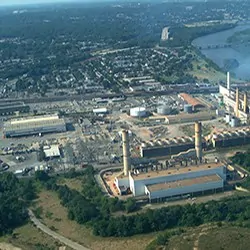SCS Engineers provides engineering and environmental assistance regarding solid waste management and transfer in the District of Columbia to the Solid Waste Transfer Facility Site Selection Advisory Panel. This Advisory Panel is using the SCS Engineers Needs Assessment Report to support recommendations to the District of Columbia City Council.
Our contribution involves:
- Analysis of solid waste quantities generated and managed within the District

- Projection of future solid waste quantities expected to be generated and managed in the District for the next 15 years
- Review of existing operating solid waste handling facilities
- Analysis of siting criteria and application of such criteria to various potential land parcels
- Environmental site analyses for the development of facility demolition and construction plans
- Engineering for refurbishments at District-owned facilities
- Construction oversight
SCS Engineers assisted the Panel with a strategic analysis of waste management alternatives in light of community concerns, modern technologies, planned and proposed zoning regulations, and regional solid waste management practices. Based on results from the public outreach process and the Panel’s final recommendations to the city council, SCS provided the design engineering and related environmental services to the Benning Road and Fort Totten Transfer Stations, including zoning hearings, public meetings, permit applications, design reviews, construction bid documents, cost estimating and construction administration.
Originally the Benning Road Transfer Station was constructed in 1970 as an incinerator, and Fort Totten was an old transfer station. The renovation work for the two sites includes:
- Demolition of the 250-foot high stacks and electrostatic precipitators at Benning Road
- Demolition of existing tipping floor and compactors and chutes at Fort Totten, with re-configuration for project construction
- Expanding the tipping floor at both facilities through a building addition, retrofit to create “tunnels” for the transfer trailers for easy loading, and bring both facilities up to capacities of approximately 2,500 tpd
- Installing scales, electronic and computer systems for facility controls, waste flow measurements, accounting/billing, security and tracking
- Installing and operating odor, dust, noise, and vector control systems so as to eliminate nuisance problems and to comply with the District’s Solid Waste Law
- Creating centralized areas for District citizens to bring in recyclables, household hazardous wastes and miscellaneous loads of self-haul solid waste materials
- Making various upgrades to the facility with regard to lighting, pavement, landscaping, existing employee locker rooms, service areas and offices


